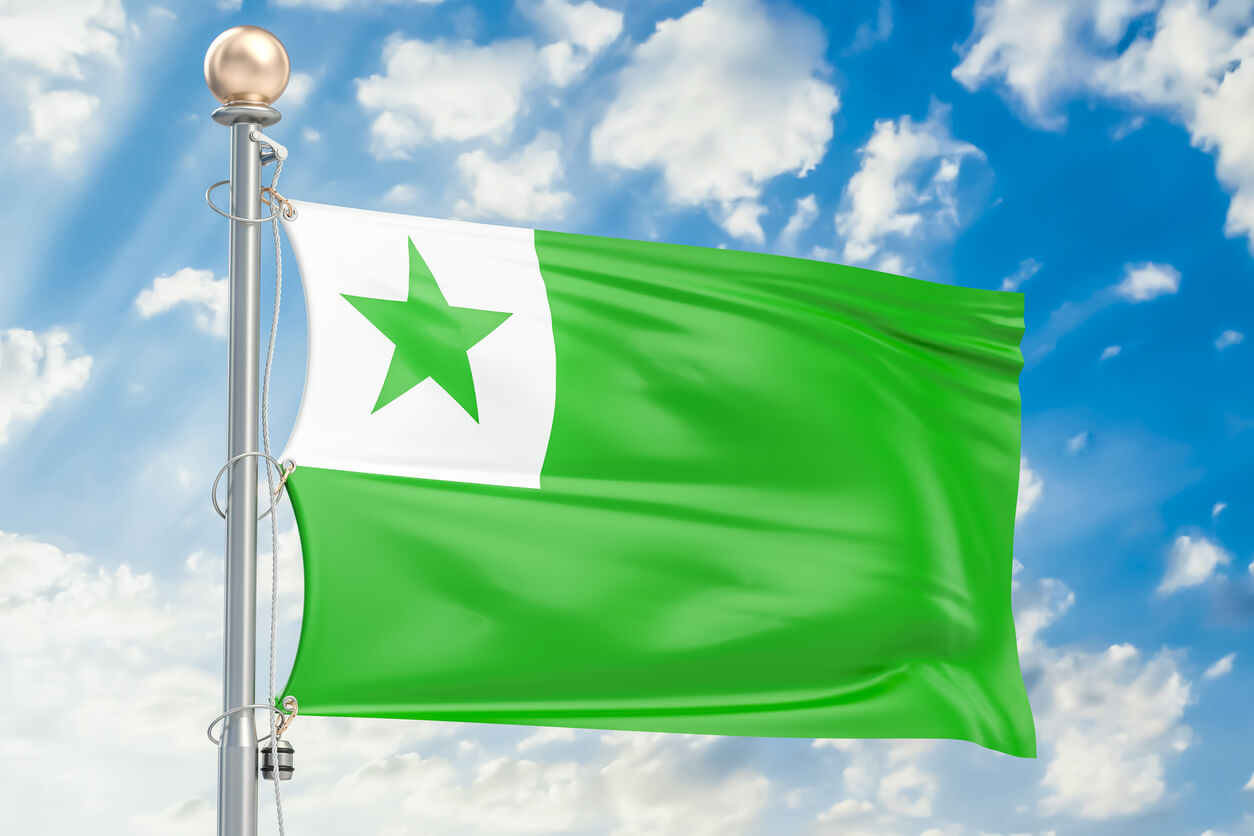15 Names of Esperanto Origin for Children

Esperanto is the language created to facilitate communication between people from different countries.
Therefore, if you want to give your child a modern and multicultural touch from birth, don’t miss this list of names of Esperanto origin for children.
The future king of your house will be recognized for carrying an original option as a title, derived from one of the most important countries in the world. Are you ready to see what we’ll suggest this time?
Discover these names of Esperanto origin for children

Esperanto is an artificial language created in 1887 by the Polish doctor Ludwik Lejzer Zamenhof. The purpose of this invention was to develop a universal, international language, capable of being used in an egalitarian and neutral way.
This language comes from Latin and its lexicon was extracted from several languages. Therefore, Esperanto names are a mixture of these languages and not a compendium of neologisms. Thus, the Esperanto alphabet is also phonetic and is written with a modified version of the Latin alphabet.
So, if you’re looking for something original and exotic, pay attention to the following list.
Names of Esperanto origin: from A to M
- Aleĉjo: diminutive in Esperanto of the name Alexander.
- Antono: derived from the name Anthony in Esperanto. In this sense, another diminutive is Anĉjo.
- Georgo: is Esperanto version of the name George.
- Jesaja: an option with biblical and spiritual origins, as it alludes to the prophet Isaiah.
- Johano: in line with the previous option, Johano alludes to John.
- Joĉjo: diminutive of John or Joseph, it hasn’t yet been well defined which option it belongs to. In any case, it’s captivating, thanks to its sonority and originality.
- Jozefo: form of the name Joseph in this peculiar universal language.
Names of Esperanto origin: K to Z
- Koralo: name of Esperanto origin meaning “coral”.
- Ludoviko: comes from Ludwig, which is the name of Ludwig Zamenhof (1859-1917), the creator of the Esperanto language. In this sense, it alludes to an “illustrious warrior”. There’s also Luĉjo, as a shorter option.
- Mikelo: modern derivative of the name Michael, which in its diminutive form would be Miĉjo.
- Nikolao: Esperanto form of the Greek name Nicholas. There’s also the diminutive which is Niĉjo .
- Paĉjo: Esperanto diminutive of Paul. In addition, this name also means “dad” in Esperanto.
- Paŭlo: diminutive for Paul.
- Petro: form of Peter in Ukrainian and also in Esperanto.
- Vilhelmo: modern derivative of the name of Germanic origin William. In this sense, there’s also Vilĉjo.

Fall in love with other countries with these 15 names of Esperanto origin for children
It’s estimated that Esperanto is currently spoken by more than 2,000,000 people. Therefore, it’s a language that’s slowly spreading and we need to wait for it to be definitively inserted in all countries for people to accept it as universal.
“Esperanto has existed for over 100 years and has proven to be an effective language for international communication. Not only does it have a future, but it also has a present.”
Source: Official Esperanto website.
If you agree with Professor Ludwig’s goal that we should all be united by a single language, it’s likely that one of these options will captivate you. If so, let us know which one you choose.
Esperanto is the language created to facilitate communication between people from different countries.
Therefore, if you want to give your child a modern and multicultural touch from birth, don’t miss this list of names of Esperanto origin for children.
The future king of your house will be recognized for carrying an original option as a title, derived from one of the most important countries in the world. Are you ready to see what we’ll suggest this time?
Discover these names of Esperanto origin for children

Esperanto is an artificial language created in 1887 by the Polish doctor Ludwik Lejzer Zamenhof. The purpose of this invention was to develop a universal, international language, capable of being used in an egalitarian and neutral way.
This language comes from Latin and its lexicon was extracted from several languages. Therefore, Esperanto names are a mixture of these languages and not a compendium of neologisms. Thus, the Esperanto alphabet is also phonetic and is written with a modified version of the Latin alphabet.
So, if you’re looking for something original and exotic, pay attention to the following list.
Names of Esperanto origin: from A to M
- Aleĉjo: diminutive in Esperanto of the name Alexander.
- Antono: derived from the name Anthony in Esperanto. In this sense, another diminutive is Anĉjo.
- Georgo: is Esperanto version of the name George.
- Jesaja: an option with biblical and spiritual origins, as it alludes to the prophet Isaiah.
- Johano: in line with the previous option, Johano alludes to John.
- Joĉjo: diminutive of John or Joseph, it hasn’t yet been well defined which option it belongs to. In any case, it’s captivating, thanks to its sonority and originality.
- Jozefo: form of the name Joseph in this peculiar universal language.
Names of Esperanto origin: K to Z
- Koralo: name of Esperanto origin meaning “coral”.
- Ludoviko: comes from Ludwig, which is the name of Ludwig Zamenhof (1859-1917), the creator of the Esperanto language. In this sense, it alludes to an “illustrious warrior”. There’s also Luĉjo, as a shorter option.
- Mikelo: modern derivative of the name Michael, which in its diminutive form would be Miĉjo.
- Nikolao: Esperanto form of the Greek name Nicholas. There’s also the diminutive which is Niĉjo .
- Paĉjo: Esperanto diminutive of Paul. In addition, this name also means “dad” in Esperanto.
- Paŭlo: diminutive for Paul.
- Petro: form of Peter in Ukrainian and also in Esperanto.
- Vilhelmo: modern derivative of the name of Germanic origin William. In this sense, there’s also Vilĉjo.

Fall in love with other countries with these 15 names of Esperanto origin for children
It’s estimated that Esperanto is currently spoken by more than 2,000,000 people. Therefore, it’s a language that’s slowly spreading and we need to wait for it to be definitively inserted in all countries for people to accept it as universal.
“Esperanto has existed for over 100 years and has proven to be an effective language for international communication. Not only does it have a future, but it also has a present.”
Source: Official Esperanto website.
If you agree with Professor Ludwig’s goal that we should all be united by a single language, it’s likely that one of these options will captivate you. If so, let us know which one you choose.
All cited sources were thoroughly reviewed by our team to ensure their quality, reliability, currency, and validity. The bibliography of this article was considered reliable and of academic or scientific accuracy.
- Folleto E, Julio EP, et al. ¿Qué es el Esperanto? [Internet]. Esperanto.es:8080. [citado 12 de octubre de 2021]. Disponible en: http://esperanto.es:8080/xmlui/bitstream/handle/11013/89/QueEsElEsperanto_Mangada.pdf?sequence=3&isAllowed=y
- Nombres de hombre en esperanto [Internet]. Nombra.me. [citado 12 de octubre de 2021]. Disponible en: https://www.nombra.me/nombres/hombre/esperanto.html
- Todopapas. 20 Nombres de niño de origen Esperanto [Internet]. Todopapas.com. [citado 12 de octubre de 2021]. Disponible en: https://www.todopapas.com/nombres/nombres-de-nino/nombres-de-origen-esperanto
This text is provided for informational purposes only and does not replace consultation with a professional. If in doubt, consult your specialist.








